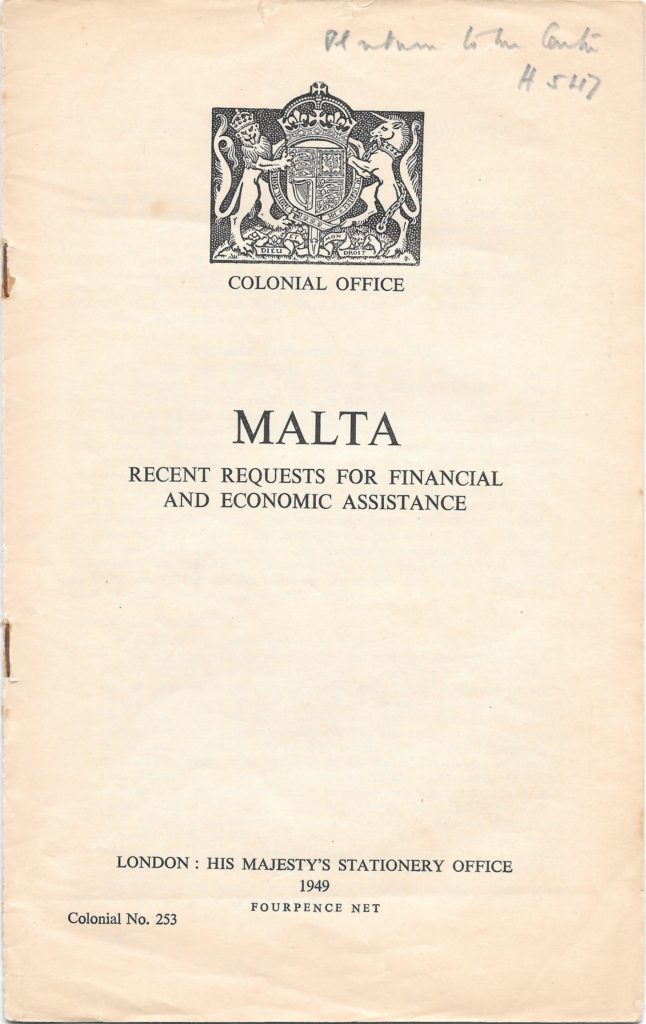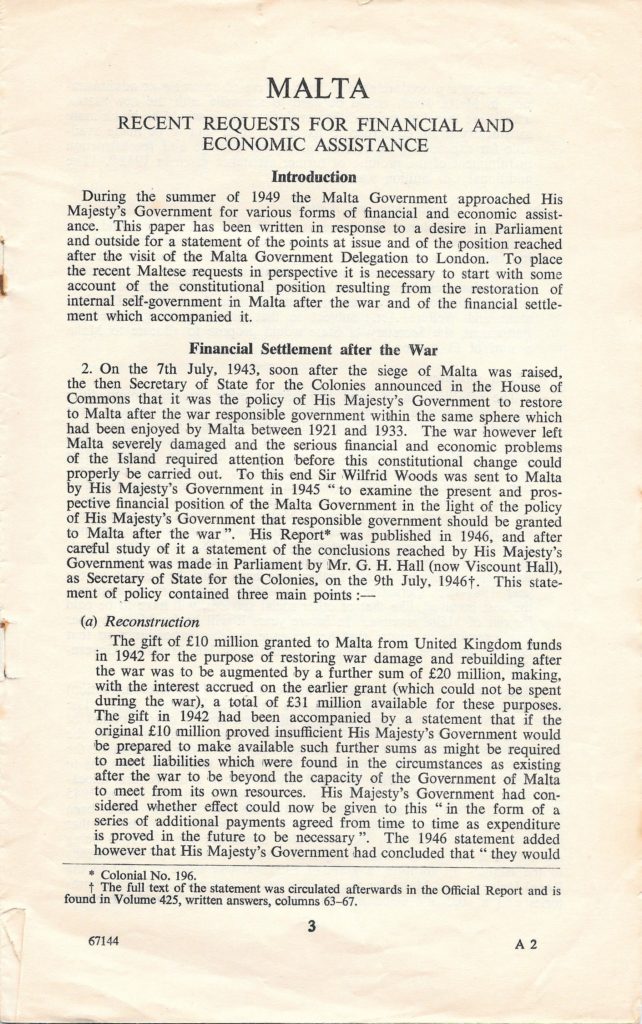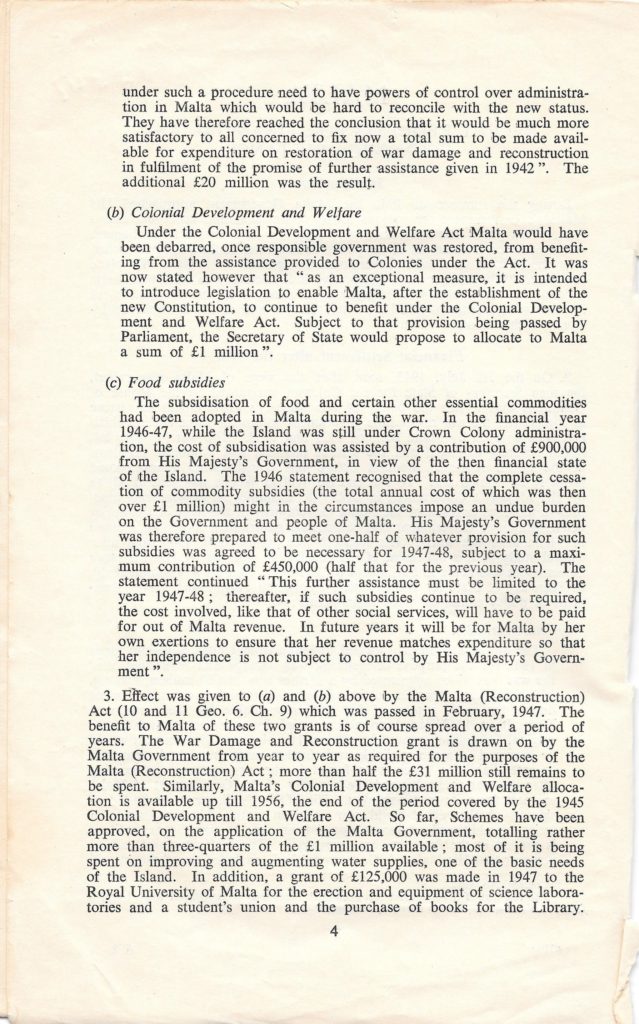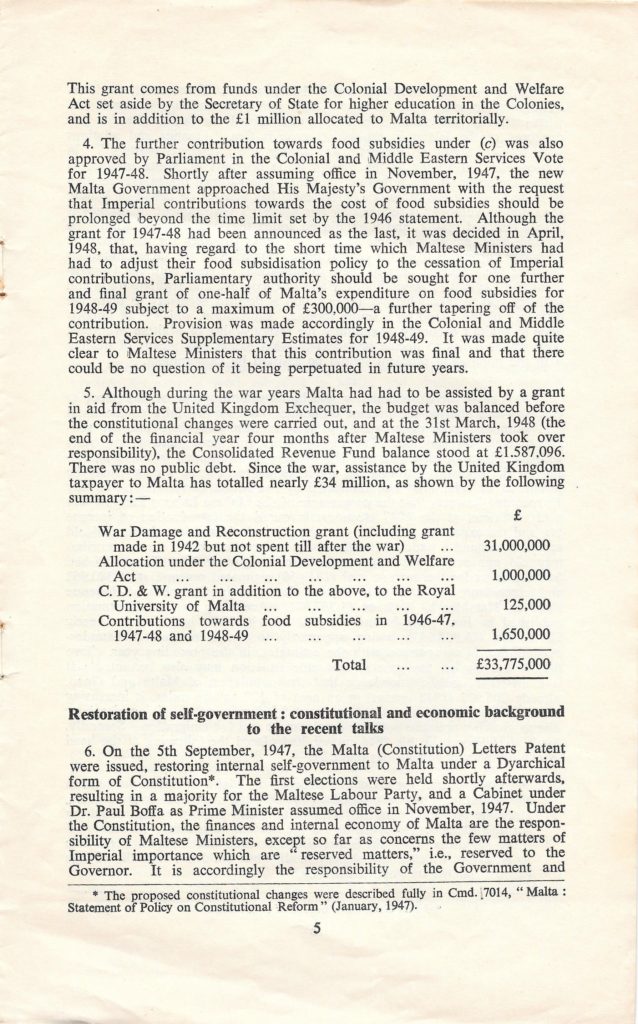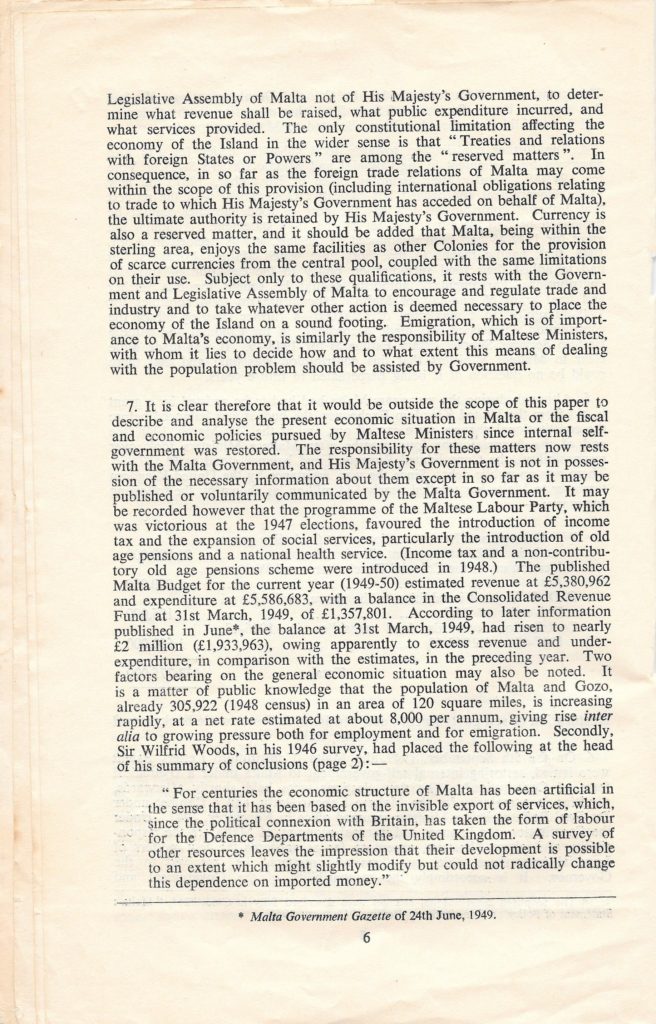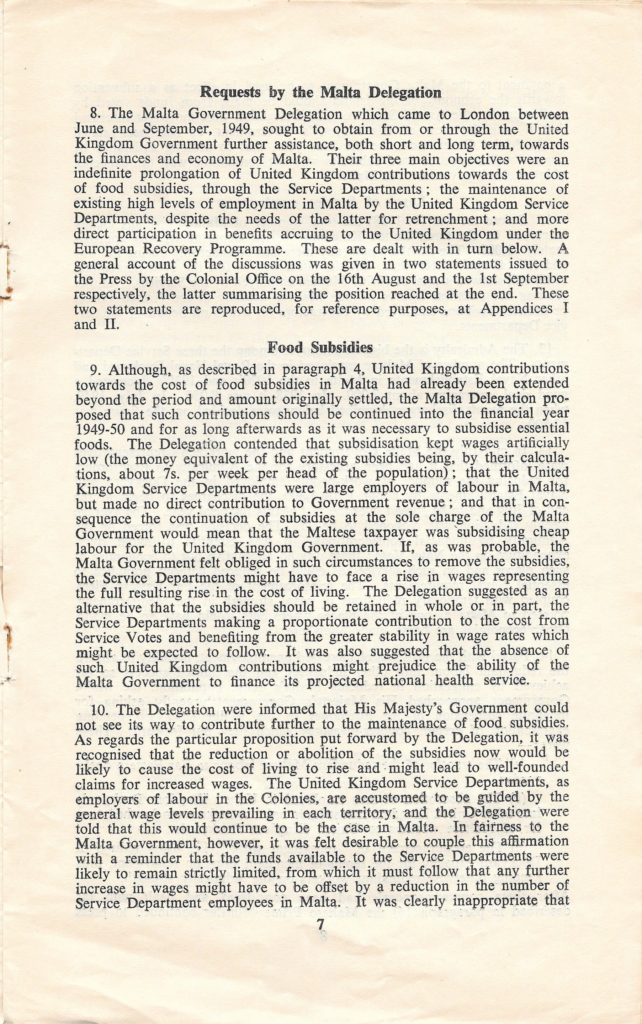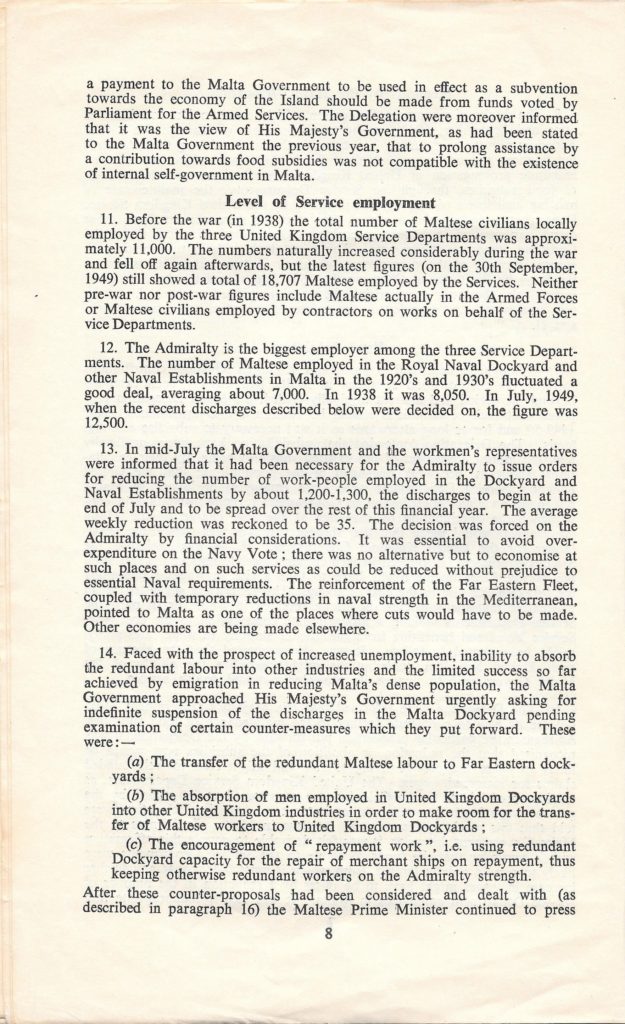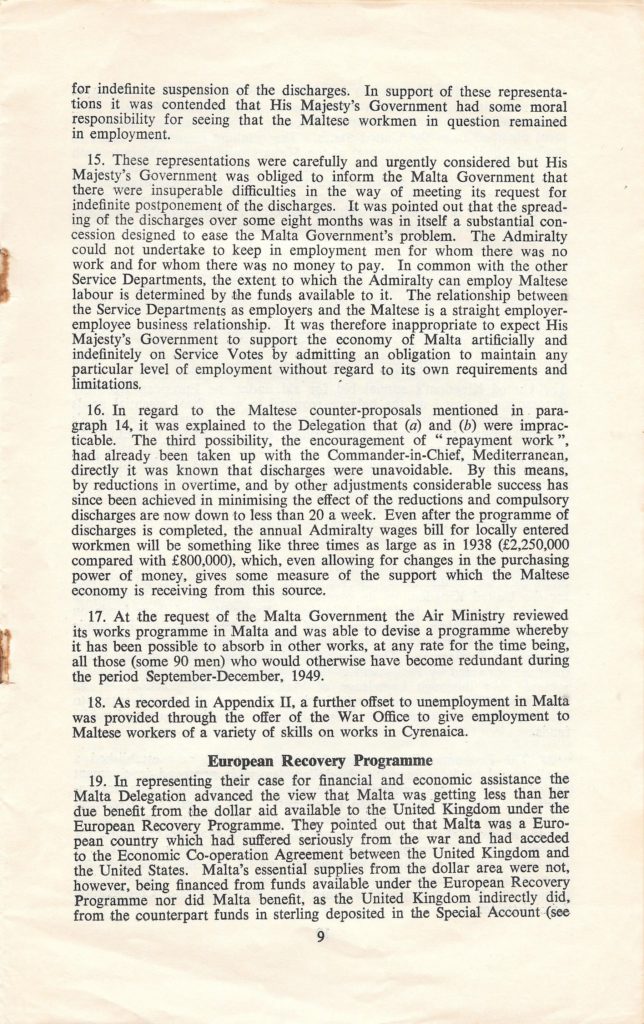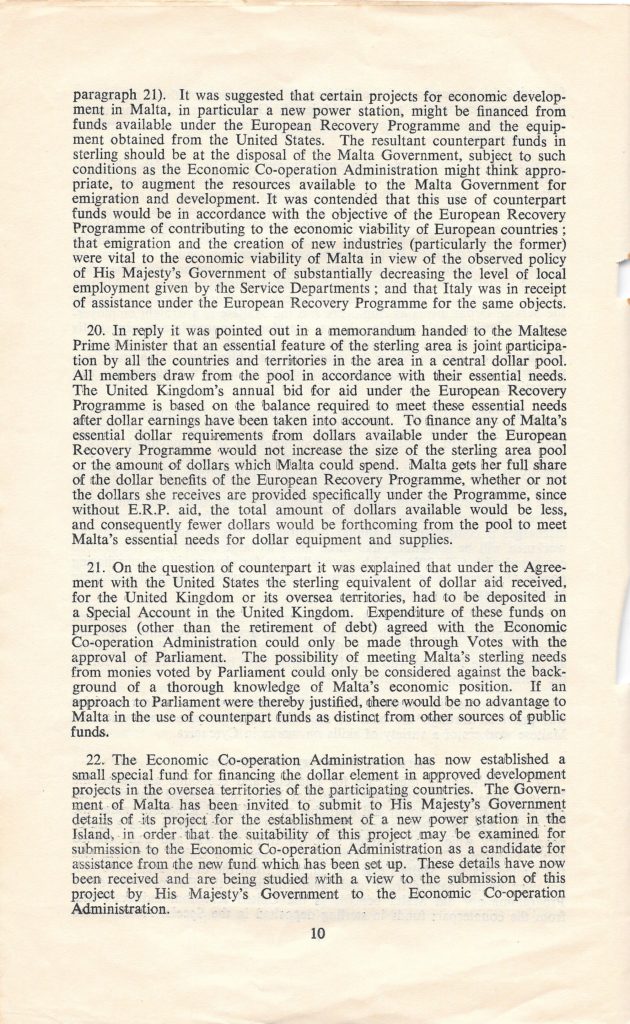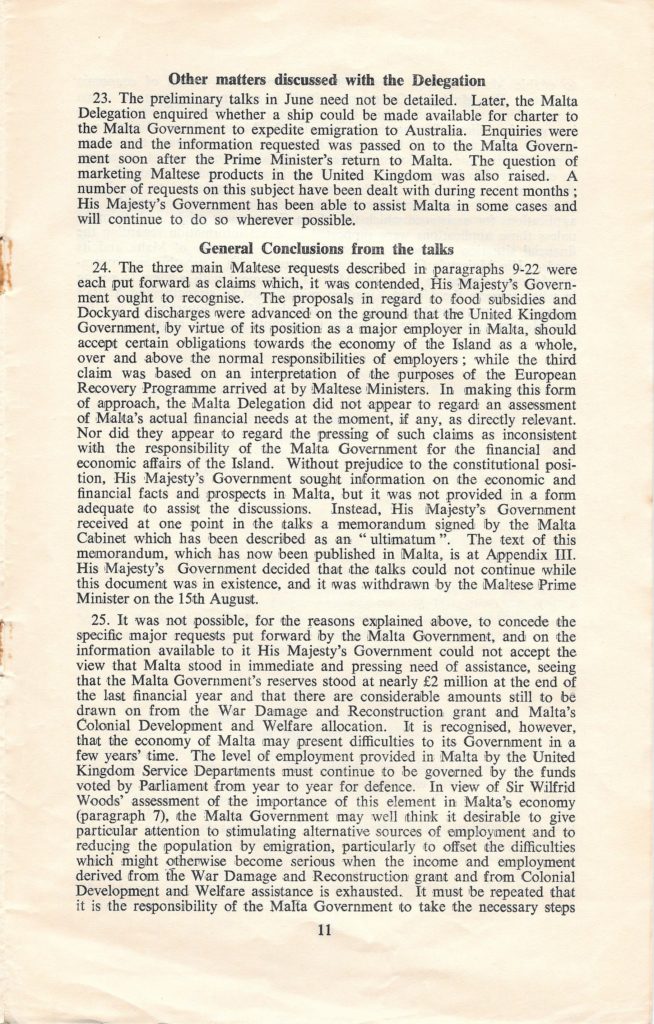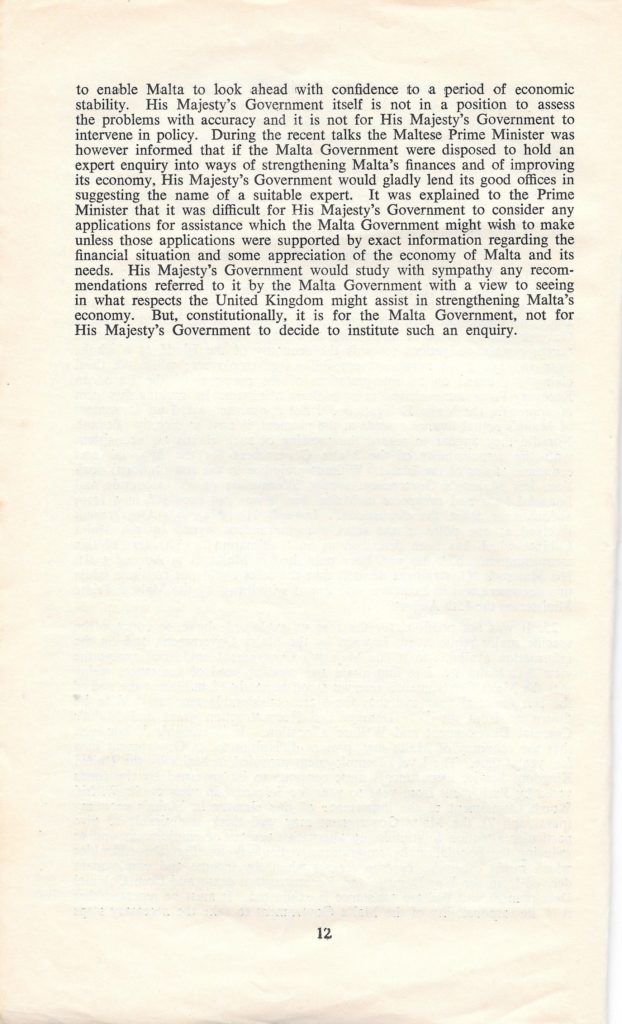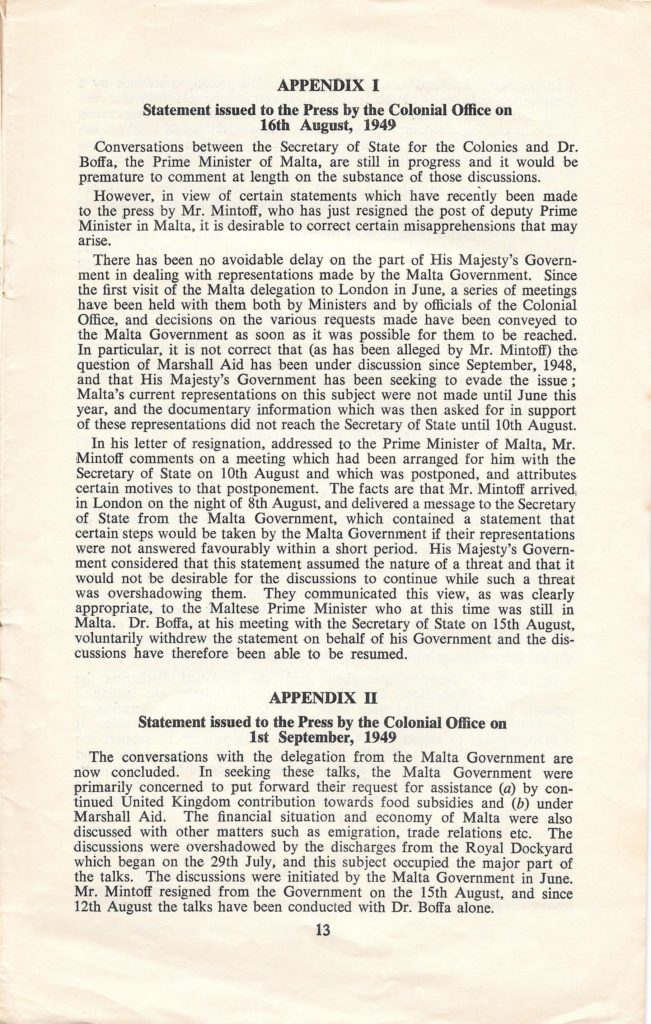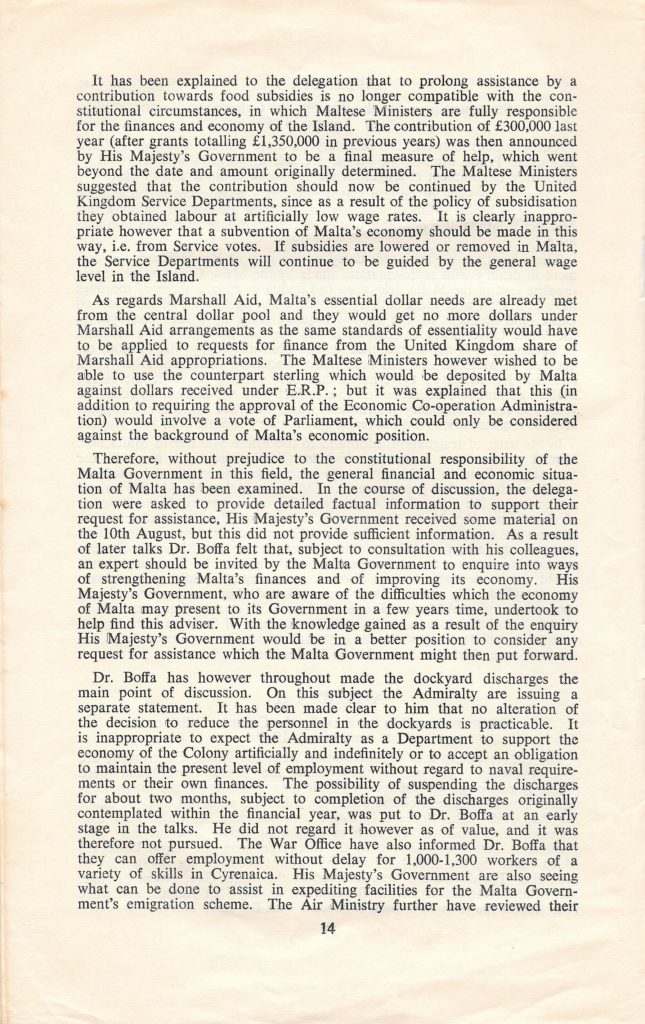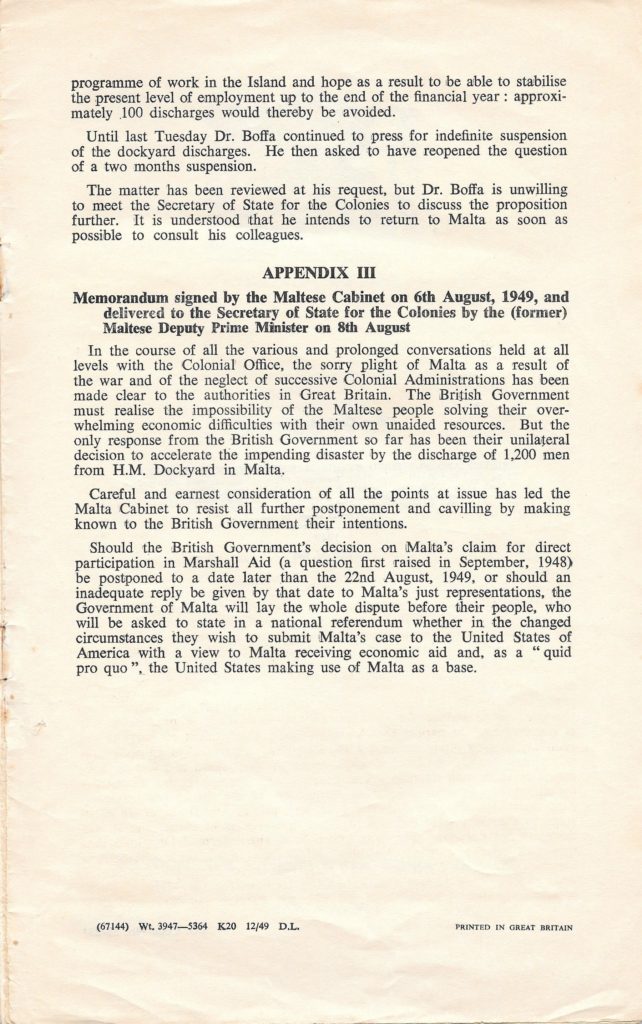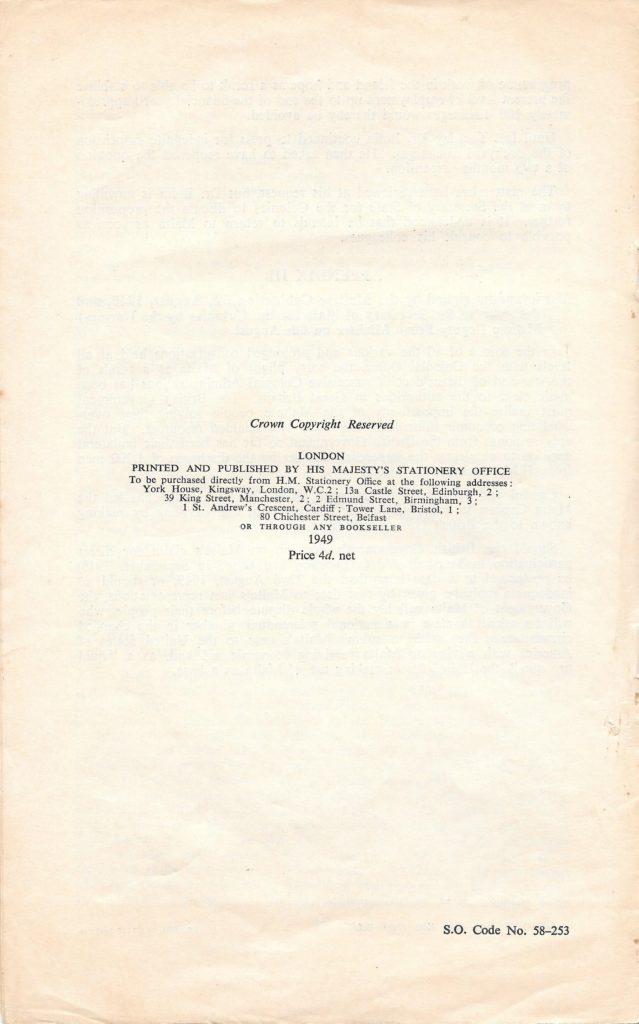Malta’s 1949 Requests for British Financial and Economic Assistance – Historical Document Analysis
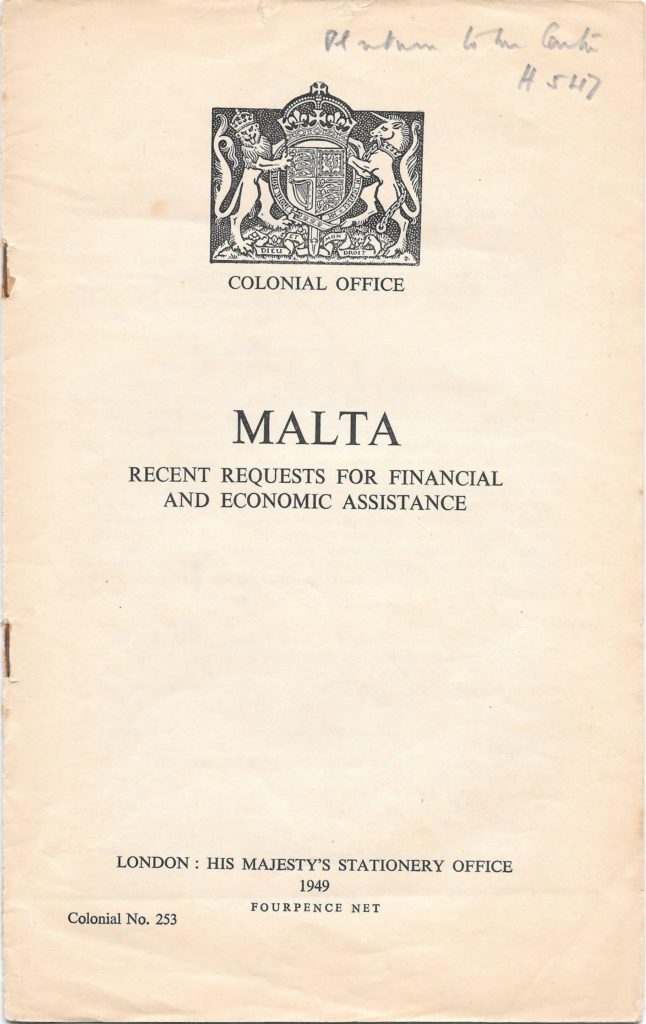
Sir Paul Boffa, OBE (30 June 1890 – 6 July 1962) was Maltese prime minister between 1947 and 1950. He took office after self-rule was reinstated by the British colonial authority following the end of World War II. In 1949, following the Malta Labour Party’s ultimatum to Britain concerning financial help, the party split up; but Paul Boffa continued as Prime Minister.
Go straight to the analysis of Malta’s 1949 requests for British financial assistance
His Majesty’s Stationery Office published a short booklet outlining Malta’s requests for financial and economic help from Britain. Costing fourpence, it lays out the proposals and arguments for aid and, from the British side, the angle of disapproval.
Britain, at the end of the war was broke. The British Empire had began to crumble – most notably with India and partition in 1947. Money had to be allocated for the reconstruction of the British nation as the country was left broke. Equally, the islands of Malta, that received the heaviest bombing per square mile in the war, was also in dire straights for the very same reason.
America, with The Marshall Plan (officially the European Recovery Program, ERP) had an initiative passed in 1948 for foreign aid to Western Europe. It transferred over $12 billion (nearly $100 billion in 2018 US dollars) in economic recovery programs to Western European economies after the end of World War II.
Malta’s position is made clear at the end of the document:
“Should the British Government’s decision on Malta’s claim for direct participation in Marshall Aid (a question first raised in September, 1948) be postponed to a date later than the 22nd August, 1949, or should an inadequate reply be given by that date to Malta’s just representations, the Government of Malta will lay the whole dispute before their people, who will be asked to state in a national referendum whether in the changed circumstances they wish to submit Malta’s case to the United States of America with a view to Malta receiving economic aid and, as a “quid pro quo”, the United States making use of Malta as a base”.
Malta wanted (needed) money from Britain to rebuild. It felt the small country in the Mediterranean, that was still a colony and had done so much in the war, was owed at least that. The outcome regarding this in 1949 was not good for Malta. However, within 14 years, it broke away from Britain, became independent and a republic in it’s own right. Relations with Britain deteriorated from the late 1940s onward and into 1970’s and beyond. Malta joined the European Union on 1 May 2004 and then the Eurozone on 1 January 2008.
I acquired a copy of the 1949 leaflet a few years ago. The pages are scanned below and an electronic transcription (subject to technical and typo errors) can be seen under the gallery of scans.
For detailed insights and expert commentary,
skip ahead to the full analysis of Malta’s 1949 financial assistance negotiations.
MALTA
RECENT REQUESTS FOR FINANCIAL AND
ECONOMIC ASSISTANCE
Introduction
During the summer of 1949 the Malta Government approached His Majesty’s Government for various forms of financial and economic assistance. This paper has been written in response to a desire in Parliament and outside for a statement of the points at issue and of the position reached after the visit of the Malta Government Delegation to London. To place the recent Maltese requests in perspective it is necessary to start with some account of the constitutional position resulting from the restoration of internal self-government in Malta after the war and of the financial settlement which accompanied it.
Financial Settlement after the War
- On the 7th July, 1943, soon after the siege of Malta was raised, the then Secretary of State for the Colonies announced in the House of Commons that it was the policy of His Majesty’s Government to restore to Malta after the war responsible government within the same sphere which had been enjoyed by Malta between 1921 and 1933. The war however left Malta severely damaged and the serious financial and economic problems of the Island required attention before this constitutional change could properly be carried out. To this end Sir Wilfrid Woods was sent to Malta by His Majesty’s Government in 1945 ” to examine the present and prospective financial position of the Malta Government in the light of the policy of His Majesty’s Government that responsible government should be granted to Malta after the war “. His Report* was published in 1946, and after careful study of it a statement of the conclusions reached by His Majesty’s Government was made in Parliament by Mr. G. H. Hall (now Viscount Hall), as Secretary of State for the Colonies, on the 9th July, 1946. This statement of .policy contained three main points :—
(a) Reconstruction
The gift of £10 million granted to Malta from United Kingdom funds in 1942 for the purpose of restoring war damage and rebuilding after the war was to be augmented by a further sum of £20 million, making, with the interest accrued on the earlier grant (which could not be spent during the war), a total of £31 million available for these purposes. The gift in 1942 had been accompanied by a statement that if the original £10 million proved insufficient His Majesty’s Government would be prepared to make available such further sums as might be required to meet liabilities which were found in the circumstances as existing after the war to be beyond the capacity of the Government of Malta to meet from its own resources. His Majesty’s Government had considered whether effect could now be given to this ” in the form of a series of ‘additional payments agreed from time to time as expenditure is proved in the future to be necessary “. The 1946 statement added however that His Majesty’s Government had concluded that ” they would
* Colonial No. 196.
fi The full text of the statement was circulated afterwards in the Official Report and is found in Volume 425, written answers, columns 63-67 under such a procedure need to have powers of control over administration in Malta which would be hard to reconcile with the new status. They have therefore reached the conclusion that it would be much more satisfactory to all concerned to fix now a total sum to be made available for expenditure on restoration of war damage and reconstruction in fulfilment of the promise of further assistance given in 1942 “. The additional £20 million was the result.
- Colonial Development and Welfare
Under the Colonial Development and Welfare Act Malta would have been debarred, once responsible government was restored, from benefiting from the assistance provided to Colonies under the Act. It was now stated however that ” as an exceptional measure, it is intended to introduce legislation to enable Malta, after the establishment of the new Constitution, to continue to benefit under the Colonial Development and Welfare Act. Subject to that provision being passed by Parliament, the Secretary of State would propose to allocate to Malta a sum of £1 million “.
- Food subsidies
The subsidisation of food and certain other essential commodities had been adopted in Malta during the war. In the financial year 1946-47, while the Island was still under Crown Colony administration, the cost of subsidisation was assisted by a contribution of £900,000 from His Majesty’s Government, in view of the then financial state of the Island. The 1946 statement recognised that the complete cessation of commodity subsidies (the total annual cost of which was then over £1 million) might in the circumstances impose an undue burden on the Government and people of Malta. His Majesty’s Government was therefore prepared to meet one-half of whatever provision for such subsidies was agreed to be necessary for 1947-48, subject to a maximum contribution of £450,000 (half that for the previous year). The statement continued ” This further assistance must be limited to the year 1947-48 ; thereafter, if such subsidies continue to be required, the cost involved, like that of other social services, will have to be paid for out of Malta revenue. In future years it will be for Malta by her own exertions to ensure that her revenue matches expenditure so that her independence is not subject to control by His Majesty’s Government “.
- Effect was given to (a) and (b) above by the Malta (Reconstruction) Act (10 and 11 Geo. 6. Ch. 9) which was passed in February, 1947. The benefit to Malta of these two grants is of course spread over a period of years. The War Damage and Reconstruction grant is drawn on by the Malta Government from year to year as required for the purposes of the Malta (Reconstruction) Act ; more than half the £31 million still remains to be spent. Similarly, Malta’s Colonial Development and Welfare allocation is available up till 1956, the end of the period covered by the 1945 Colonial Development and Welfare Act. So far, Schemes have been approved, on the application of the Malta Government, totalling rather more than three-quarters of the £1 million available ; most of it is being spent on improving and augmenting water supplies, one of the basic needs of the Island. In addition, a grant of £125,000 was made in 1947 to the Royal University of Malta for the erection and equipment of science laboratories and a student’s union and the purchase of books for the Library.
This grant comes from funds under the Colonial Development and Welfare Act set aside by the Secretary of State for higher education in the Colonies, and is in addition to the El million allocated to Malta territorially.
- The further contribution towards food subsidies under (c) was also approved by Parliament in the Colonial and Middle Eastern Services Vote for 1947-48. Shortly after assuming office in November, 1947, the new Malta Government approached His Majesty’s Government with the request that Imperial contributions towards the cost of food subsidies should be prolonged beyond the time limit set by the 1946 statement. Although the grant for 1947-48 had been announced as the last, it was decided in April, 1948, that, having regard to the short time which Maltese Ministers had had to adjust their food subsidisation policy to the cessation of Imperial contributions, Parliamentary authority should be sought for one further and final grant of one-half of Malta’s expenditure on food subsidies for 1948-49 subject to a maximum of £300.000—a further tapering off of the Provision was made accordingly in the Colonial and Middle Eastern Services Supplementary Estimates for 1948-49. It was made quite clear to Maltese Ministers that this contribution was final and that there could be no question of it being perpetuated in future years.
- Although during the war years Malta had had to be assisted by a grant in aid from the United Kingdom Exchequer, the budget was balanced before the constitutional changes were carried out, and at the 31st March, 1948 (the end of the financial year four months after Maltese Ministers took over responsibility), the Consolidated Revenue Fund balance stood at £1.587.096. There was no public debt. Since the war, assistance by the United Kingdom taxpayer to Malta has totalled nearly £34 million, as shown by the following summary:—
War Damage and Reconstruction grant (including grant
made in 1942 but not spent till after the war) … 31,000,000
Allocation under the Colonial Development and Welfare
Act … … … … … … … 1,000,000
- D. & W. grant in addition to the above, to the Royal
University of Malta … ••• … … … 125,000
Contributions towards food subsidies in 1946-47.
1947-48 and 1948-49 … 1,650,000
Total . £33,775,000
Restoration of self-government : constitutional and economic background
to the recent talks
- On the 5th September, 1947, the Malta (Constitution) Letters Patent were issued, restoring internal self-government to Malta under a Dyarchical form of Constitution*. The first elections were held shortly afterwards, resulting in a majority for the Maltese Labour Party, and a Cabinet under Paul Boffa as Prime Minister assumed office in November, 1947. Under the Constitution, the finances and internal economy of Malta are the responsibility of Maltese Ministers, except so far as concerns the few matters of Imperial importance which are ” reserved matters,” i.e., reserved to the Governor. It is accordingly the responsibility of the Government and Legislative Assembly of Malta not of His Majesty’s Government, to determine what revenue shall be raised, what public expenditure incurred, and what services provided. The only constitutional limitation affecting the economy of the Island in the wider sense is that ” Treaties and relations with foreign States or Powers ” are among the ” reserved matters “. In consequence, in so far as the foreign trade relations of Malta may come within the scope of this provision (including international obligations relating to trade to which His Majesty’s Government has acceded on behalf of Malta), the ultimate authority is retained by His Majesty’s Government. Currency is also a reserved matter, and it should be added that Malta, being within the sterling area, enjoys the same facilities as other Colonies for the provision of scarce currencies from the central pool, coupled with the same limitations on their use. Subject only to these qualifications, it rests with the Government and Legislative Assembly of Malta to encourage and regulate trade and industry and to take whatever other action is deemed necessary to place the economy of the Island on a sound footing. Emigration, which is of importance to Malta’s economy, is similarly the responsibility of Maltese Ministers, with whom it lies to decide how and to what extent this means of dealing with the population problem should be assisted by Government.
- It is clear therefore that it would be outside the scope of this paper to describe and analyse the present economic situation in Malta or the fiscal and economic policies pursued by Maltese Ministers since internal self-government was restored. The responsibility for these matters now rests with the Malta Government, and His Majesty’s Government is not in possession of the necessary information about them except in so far as it may be published or voluntarily communicated by the Malta Government. It may be recorded however that the programme of the Maltese Labour Party, which was victorious at the 1947 elections, favoured the introduction of income tax and the expansion of social services, particularly the introduction of old age pensions and a national health service. (Income tax and a non-contributory old age pensions scheme were introduced in 1948.) The published Malta Budget for the current year (1949-50) estimated revenue at £5,380,962 and expenditure at £5,586,683, with a balance in the Consolidated Revenue Fund at 31st March, 1949, of £1,357,801. According to later information published in June*, the balance at 31st March, 1949, had risen to nearly £2 million (£1,933,963), owing apparently to excess revenue and under-expenditure, in comparison with the estimates, in the preceding year. Two factors bearing on the general economic situation may also be noted. It is a matter of public knowledge that the population of Malta and Gozo, already 305,922 (1948 census) in an area of 120 square miles, is increasing rapidly, at a net rate estimated at about 8,000 per annum, giving rise inter alia to growing pressure both for employment and for emigration. Secondly, Sir Wilfrid Woods, in his 1946 survey, had placed the following at the head of his summary of conclusions (page 2):—
“For centuries the economic structure of Malta has been artificial in the sense that it has been based on the invisible export of services, which, since the political connexion with Britain, has taken the form of labour for the Defence Departments of the United Kingdom. A survey of other resources leaves the impression that their development is possible to an extent which might slightly modify but could not radically change this dependence on imported money.”
* Malta Government Gazette of 24th June, 1949.
Requests by the Malta Delegation
- The Malta Government Delegation which came to London between June and September, 1949, sought to obtain from or through the United Kingdom Government further assistance, both short and long term, towards the finances and economy of Malta. Their three main objectives were an indefinite prolongation of United Kingdom contributions towards the cost of food subsidies, through the Service Departments ; the maintenance of existing high levels of employment in Malta by the United Kingdom Service Departments, despite the needs of the latter for retrenchment ; and more direct participation in benefits accruing to the United Kingdom under the European Recovery Programme. These are dealt with in turn below. A general account of the discussions was given in two statements issued to the Press by the Colonial Office on the 16th August and the 1st September respectively, the latter summarising the position reached at the end. These two statements are reproduced, for reference purposes, at Appendices I and II.
Food Subsidies
- Although, as described in paragraph 4, United Kingdom contributions towards the cost of food subsidies in Malta had already been extended beyond the period and amount originally settled, the Malta Delegation proposed that such contributions should be continued into the financial year 1949-50 and for as long afterwards as it was necessary to subsidise essential The Delegation contended that subsidisation kept wages artificially low (the money equivalent of the existing subsidies being, by their calculations, about 7s. per week per head of the population) ; that the United Kingdom Service Departments were large employers of labour in Malta, but made no direct contribution to Government revenue ; and that in consequence the continuation of subsidies at the sole charge of the Malta Government would mean that the Maltese taxpayer was subsidising cheap labour for the United Kingdom Government. If, as was probable, the Malta Government felt obliged in such circumstances to remove the subsidies, the Service Departments might have to face a rise in wages representing the full resulting rise in the cost of living. The Delegation suggested as an alternative that the subsidies should be retained in whole or in part, the Service Departments making a proportionate contribution to the cost from Service Votes and benefiting from the greater stability in wage rates which might be expected to follow. It was also suggested that the absence of such United Kingdom contributions might prejudice the ability of the Malta Government to finance its projected national health service.
- The Delegation were informed that His Majesty’s Government could not see its way to contribute further to the maintenance of food subsidies. As regards the particular proposition put forward by the Delegation, it was recognised that the reduction or abolition of the subsidies now would be likely to cause the cost of living to rise and might lead to well-founded claims for increased wages. The United Kingdom Service Departments, as employers of labour in the Colonies,- are accustomed to be guided by the general wage levels prevailing in each territory, and the Delegation were told that this would continue to be the case in Malta. In fairness to the Malta Government, however, it was felt desirable to couple this affirmation with a reminder that the funds available to the Service Departments were likely to remain strictly limited, from which it must follow that any further increase in wages might have to be offset by a reduction in the number of Department employees in Malta. It was, clearly inappropriate that a payment to the Malta Government to be used in effect as a subvention towards the economy of the Island should be made from funds voted by Parliament for the Armed Services. The Delegation were moreover informed that it was the view of His Majesty’s Government, as had been stated to the Malta Government the previous year, that to prolong assistance by a contribution towards food subsidies was not compatible with the existence of internal self-government in Malta.Level of Service employment
- Before the war (in 1938) the total number of Maltese civilians locally employed by the three United Kingdom Service Departments was approximately 11,000. The numbers naturally increased considerably during the war and fell off again afterwards, but the latest figures (on the 30th September, 1949) still showed a total of 18,707 Maltese employed by the Services. Neither pre-war nor post-war figures include Maltese actually in the Armed Forces or Maltese civilians employed by contractors on works on behalf of the Service Departments.
- The Admiralty is the biggest employer among the three Service Depart The number of Maltese employed in the Royal Naval Dockyard and other Naval Establishments in Malta in the 1920’s and 1930’s fluctuated a good deal, averaging about 7,000. In 1938 it was 8,050. In July, 1949, when the recent discharges described below were decided on, the figure was 12,500.
- In mid-July the Malta Government and the workmen’s representatives were informed that it had been necessary for the Admiralty to issue orders for reducing the number of work-people employed in the Dockyard and Naval Establishments by about 1,200-1,300, the discharges to begin at the end of July and to be spread over the rest of this financial year. The average weekly reduction was reckoned to be 35. The decision was forced on the Admiralty by financial considerations. It was essential to avoid over expenditure on the Navy Vote ; there was no alternative but to economise at such places and on such services as could be reduced without prejudice to essential Naval requirements. The reinforcement of the Far Eastern Fleet, coupled with temporary reductions in naval strength in the Mediterranean, pointed to Malta as one of the places where cuts would have to be made. Other economies are being made elsewhere.
- Faced with the prospect of increased unemployment, inability to absorb the redundant labour into other industries and the limited success so far achieved by emigration in reducing Malta’s dense population, the Malta Government approached His Majesty’s Government urgently asking for indefinite suspension of the discharges in the Malta Dockyard pending examination of certain counter-measures which they put forward. These were :—
- The transfer of the redundant Maltese labour to Far Eastern dockyards
- The absorption of men employed in United Kingdom Dockyards into other United Kingdom industries in order to make room for the transfer of Maltese workers to United Kingdom Dockyards ;
- The encouragement of ” repayment work “> i.e. using redundant Dockyard capacity for the repair of merchant ships on repayment, thus keeping otherwise redundant workers on the Admiralty strength.
After these counter-proposals had been considered and dealt with (as
described in paragraph 16) the Maltese Prime Minister continued to press for indefinite suspension of the discharges. In support of these representations it was contended that His Majesty’s Government had some moral responsibility for seeing that the Maltese workmen in question remained in employment.- These representations were carefully and urgently considered but His Majesty’s Government was obliged to inform the Malta Government that there were insuperable difficulties in the way of meeting its request for indefinite postponement of the discharges. It was pointed out that the spreading of the discharges over some eight months was in itself a substantial concession designed to ease the Malta Government’s problem. The Admiralty could not undertake to keep in employment men for whom there was no work and for whom there was no money to pay. In common with the other Service Departments, the extent to which the Admiralty can employ Maltese labour is determined by the funds available to it. The relationship between the Service Departments as employers and the Maltese is a straight employer-employee business relationship. It was therefore inappropriate to expect His Majesty’s Government to support the economy of Malta artificially and indefinitely on Service Votes by admitting an obligation to maintain any particular level of employment without regard to its own requirements and
- In regard to the Maltese counter-proposals mentioned in paragraph 14, it was explained to the Delegation that (a) and (b) were imprac The third possibility, the encouragement of ” repayment work “, had already been taken up with the Commander-in-Chief, Mediterranean, directly it was known that discharges were unavoidable. By this means, by reductions in overtime, and by other adjustments considerable success has since been achieved in minimising the effect of the reductions and compulsory discharges are now down to less than 20 a week. Even after the programme of discharges is completed, the annual Admiralty wages bill for locally entered workmen will be something like three times as large as in 1938 (£2,250,000 compared with £800,000), which, even allowing for changes in the purchasing power of money, gives some measure of the support which the Maltese economy is receiving from this source.
- At the request of the Malta Government the Air Ministry reviewed its works programme in Malta and was able to devise a programme whereby it has been possible to absorb in other works, at any rate for the time being, all those (some 90 men) who would otherwise have become redundant during the period September-December, 1949.
- As recorded in Appendix IL a further offset to unemployment in Malta was provided through the offer of the War Office to give employment to Maltese workers of a variety of skills on works in Cyrenaica.
European Recovery Programme
- In representing their case for financial and economic assistance the Malta Delegation advanced the view that Malta was getting less than her due benefit from the dollar aid available to the United Kingdom under the European Recovery Programme. They pointed out that Malta was a European country which had suffered seriously from the war and had acceded to the Economic Co-operation Agreement between the United. Kingdom and the United States. Malta’s essential supplies from the dollar area were not, however, being financed from funds available under the European Recovery Programme nor did Malta benefit, as the United Kingdom indirectly did, from the counterpart funds in sterling deposited in the Special Account (see paragraph 21). It was suggested that certain projects for economic development in Malta, in particular a new power station, might be financed from funds available under the European Recovery Programme and the equipment obtained from the United States. The resultant counterpart funds in sterling should be at the disposal of the Malta Government, subject to such conditions as the Economic Co-operation Administration might think appropriate, to augment the resources available to the Malta Government for emigration and development. It was contended that this use of counterpart funds would be in accordance with the objective of the European Recovery Programme of contributing to the economic viability of European countries ; that emigration and the creation of new industries (particularly the former) were vital to the economic viability of Malta in view of the observed policy of His Majesty’s Government of substantially decreasing the level of local employment given by the Service Departments ; and that Italy was in receipt of assistance under the European Recovery Programme for the same objects.
- In reply it was pointed out in a memorandum handed to the Maltese Prime Minister that an essential feature of the sterling area is joint participation by all the countries and territories in the area in a central dollar pool. All members draw from the pool in accordance with their essential needs. The United Kingdom’s annual bid for aid under the European Recovery Programme is based on the balance required to meet these essential needs after dollar earnings have been taken into account. To finance any of Malta’s essential dollar requirements from dollars available under the European Recovery Programme would not increase the size of the sterling area pool or the amount of dollars which Malta could spend. Malta gets her full share of the dollar benefits of the European Recovery Programme, whether or not the dollars she receives are provided specifically under the Programme, since without E.R.P. aid, the total amount of dollars available would be less, and consequently fewer dollars would be forthcoming from the pool to meet Malta’s essential needs for dollar equipment and supplies.
- On the question of counterpart it was explained that under the Agreement with the United States the sterling equivalent of dollar aid received, for the United Kingdom or its oversea territories, had to be deposited in a Special Account in the United Kingdom. ‘Expenditure of these funds on purposes (other than the retirement of debt) agreed with the Economic Co-operation Administration could only be made through Votes with the approval of Parliament. The possibility of meeting Malta’s sterling needs from monies voted by Parliament could only be considered against the background of a thorough knowledge of Malta’s economic position. If an approach to Parliament were thereby justified, there would be no advantage to Malta in the use of counterpart funds as distinct from other sources of public
22.. The Economic Co-operation Administration has now established a small .special f und. for financing the dollar element in approved development projects in the oversea territories of the participating countries. The Government • of Malta. has been -invited to submit to His Majesty’s Government details of tits project .for the establishment of a new power [station in the
. in -order that the suitability of this project may be examined for submission to the Economic ‘Co-operation Administration as a candidate for assistance from the new fund_ which has been set up. These details have now been received and are being studied with a view to the submission of this project by His Majesty’s Government to the Economic Co-operation Administration.
Other matters discussed with the Delegation
- The preliminary talks in June need not be detailed. Later, the Malta Delegation enquired whether a ship could be made available for charter to the Malta Government to expedite emigration to Australia. Enquiries were made and the information requested was passed on to the Malta Government soon after the Prime Minister’s return to Malta. The question of marketing Maltese products in the United Kingdom was also raised. A number of requests on this subject have been dealt with during recent months ; His Majesty’s Government has been able to assist Malta in some cases and will continue to do so wherever possible.
General Conclusions from the talks
-
- The three main Maltese requests described in paragraphs 9-22 were each put forward as claims which, it was contended, His Majesty’s Government ought to recognise. The proposals in regard to food subsidies and Dockyard discharges were advanced on the ground that the United Kingdom Government, by virtue of its position as a major employer in Malta, should accept certain obligations towards ‘the economy of the Island as a whole, over and above the normal responsibilities of employers ; while the third claim was based on an interpretation of the purposes of the European Recovery Programme arrived at by Maltese Ministers. In making this form of approach, the Malta Delegation did not appear to regard an assessment of Malta’s actual financial needs at the moment, if any, as directly relevant. Nor did they appear Ito regard the pressing of such claims as inconsistent with the responsibility of the Malta Government for the financial and economic affairs of the Island. Without prejudice to the constitutional position, His Majesty’s Government sought information on the economic and financial facts and prospects in Malta, but it was not provided in a form adequate to assist the discussions. Instead, His Majesty’s Government received at one point in the talks a memorandum signed by the Malta Cabinet which has been described as an ” ultimatum “. The text of this memorandum, which has now been published in Malta, is at Appendix III. His ‘Majesty’s Government decided that the talks could not continue while this document was in existence, and it was withdrawn ‘by the Maltese Prime Minister on the 15th August.
- It was not possible, for the reasons explained above, to concede the specific major requests put forward by the Malta Government, and on the information available to it His Majesty’s Government could not accept the view that Malta stood in immediate and pressing need of assistance, seeing that the Malta Government’s reserves stood at nearly £2 million at the end of the last financial year and that there are considerable amounts still to be drawn on from the War Damage and Reconstruction grant and Malta’s Colonial Development and Welfare allocation. It is recognised, however, that the economy of Malta may present difficulties to its Government in a few years’ time. The level of employment provided in; Malta by the United Kingdom Service Departments must continue to be governed by the funds voted by Parliament from year to year for defence. In view of Sir Wilfrid Woods’ assessment of the importance of this element in Malta’s economy (paragraph 7), the Malta Government may well think it desirable to give particular attention to stimulating alternative sources of employment and to reducing the population by emigration, particularly to offset the difficulties which might otherwise become serious when the income and employment derived from the War Damage and Reconstruction grant and from Colonial Development and Welfare assistance is exhausted. It must ‘be repeated that it is the responsibility of the Malta Government to take the necessary steps to enable Malta to look ahead with confidence to a period of economic stability. His Majesty’s Government itself is not in a position to assess the problems with accuracy and it is not for His Majesty’s Government to intervene in policy. During the recent talks the Maltese Prime Minister was however informed that if the Malta Government were disposed to hold an expert enquiry into ways of strengthening Malta’s finances and of improving its economy, His Majesty’s Government would gladly lend its good offices in suggesting the name of a suitable expert. It was explained to the Prime Minister that it was difficult for His Majesty’s Government to consider any applications for assistance which the Malta Government might wish to make unless those applications were supported by exact information regarding the financial situation and some appreciation of the economy of Malta and its needs. His Majesty’s Government would study with sympathy any recommendations referred to it by the Malta Government with a view to seeing in what respects the United Kingdom might assist in strengthening Malta’s economy. But, constitutionally, it is for the Malta Government, not for His Majesty’s Government to decide to institute such an enquiry.APPENDIXStatement issued to the Press by the Colonial Office on 16th August, 1949Conversations between the Secretary of State for the Colonies and Dr. Boffa, the Prime Minister of Malta, are still in progress and it would be premature to comment at length on the substance of those discussions.However, in view of certain statements which have recently been made to the press by Mr. Mintoff, who has just resigned the post of deputy Prime Minister in Malta, it is desirable to correct certain misapprehensions that may arise.There has been no avoidable delay on the part of His Majesty’s Government in dealing with representations made by the Malta Government. Since the first visit of the Malta delegation to London in June, a series of meetings have been held with them both by Ministers and by officials of the Colonial Office, and decisions on the various requests made have been conveyed to the Malta Government as soon as it was possible for them to be reached. In particular, it is not correct that (as has been alleged by Mr. Mintoff) the question of Marshall Aid has been under discussion since September, 1948, and that His Majesty’s Government has been seeking to evade the issue ; Malta’s current representations on this subject were not made until June this year, and the documentary information which was then asked for in support of these representations did not reach the Secretary of State until 10th August.In his letter of resignation, addressed to the Prime Minister of Malta, Mr. Mintoff comments on a meeting which had been arranged for him with the Secretary of State on 10th August and which was postponed, and attributes certain motives to that postponement. The facts are that Mr. Mintoff arrived, in London on the night of 8th August, and delivered a message to the Secretary of State from the Malta Government, which contained a statement that certain steps would be taken by the Malta Government if their representations were not answered favourably within a short period. His Majesty’s Government considered that this statement assumed the nature of a threat and that it would not be desirable for the discussions to continue while such a threat was overshadowing them. They communicated this view, as was clearly appropriate, to the Maltese Prime Minister who at this time was still in Malta. Dr. Boffa, at his meeting with the Secretary of State on 15th August, voluntarily withdrew the statement on behalf of his Government and the discussions have therefore been able to be resumed.APPENDIX IIStatement issued to the Press by the Colonial Office on 1st September, 1949The conversations with the delegation from the Malta Government are now concluded. In seeking these talks, the Malta Government were primarily concerned to put forward their request for assistance (a) by continued United Kingdom contribution towards food subsidies and (b) under Marshall Aid. The financial situation and economy of Malta were also discussed with other matters such as emigration, trade relations etc. The discussions were overshadowed by the discharges from the Royal Dockyard which began on the 29th July, and this subject occupied the major part of the talks. The discussions were initiated by the Malta Government in June. Mr. Mintoff resigned from the Government on the 15th August, and since 12th August the talks have been conducted with Dr. Boffa alone.It has been explained to the delegation that to prolong assistance by a contribution towards food subsidies is no longer compatible with the constitutional circumstances, in which Maltese Ministers are fully responsible for the finances and economy of the Island. The contribution of £300,000 last year (after grants totalling £1,350,000 in previous years) was then announced by His Majesty’s Government to be a final measure of help, which went beyond the date and amount originally determined. The Maltese Ministers suggested that the contribution should now be continued by the United Kingdom Service Departments, since as a result of the policy of subsidisation they obtained labour at artificially low wage rates. It is clearly inappropriate however that a subvention of Malta’s economy should be made in this way, i.e. from Service votes. If subsidies are lowered or removed in Malta, the Service Departments will continue to be guided by the general wage level in the Island.As regards Marshall Aid, Malta’s essential dollar needs are already met from the central dollar pool and they would get no more dollars under Marshall Aid arrangements as the same standards of essentiality would have to be applied to requests for finance from the United Kingdom share of Marshall Aid appropriations. The Maltese Ministers however wished to be able to use the counterpart sterling which would be deposited by Malta against dollars received under E.R.P. ; but it was explained that this (in addition to requiring the approval of the Economic Co-operation Administration) would involve a vote of Parliament, which could only be considered against the background of Malta’s economic position.Therefore, without prejudice to the constitutional responsibility of the Malta Government in this field, the general financial and economic situation of Malta has been examined. In the course of discussion, the delegation were asked to provide detailed factual information to support their request for assistance, His Majesty’s Government received some material on the 10th August, but this did not provide sufficient information. As a result of later talks Dr. Boffa felt that, subject to consultation with his colleagues, an expert should be invited by the Malta Government to enquire into ways of strengthening Malta’s finances and of improving its economy. His Majesty’s Government, who are aware of the difficulties which the economy of Malta may present to its Government in a few years time, undertook to help find this adviser. With the knowledge gained as a result of the enquiry His Majesty’s Government would be in a better position to consider any request for assistance which the Malta Government might then put forward.Dr. Boffa has however throughout made the dockyard discharges the main point of discussion. On this subject the Admiralty are issuing a separate statement. It has been made clear to him that no alteration of the decision to reduce the personnel in the dockyards is practicable. It is inappropriate to expect the Admiralty as a Department to support the economy of the Colony artificially and indefinitely or to accept an obligation to maintain the present level of employment without regard to naval requirements or their own finances. The possibility of suspending the discharges for about two months, subject to completion of the discharges originally contemplated within the financial year, was put to Dr. Boffa at an early stage in the talks. He did not regard it however as of value, and it was therefore not pursued. The War Office have also informed Dr. Boffa that they can offer employment without delay for 1,000-1,300 workers of a variety of skills in Cyrenaica. His Majesty’s Government are also seeing what can be done to assist in expediting facilities for the Malta Government’s emigration scheme. The Air Ministry further have reviewed their programme of work in the Island and hope as a result to be able to stabilise the present level of employment up to the end of the financial year : approximately .100 discharges would thereby be avoided.Until last Tuesday Dr. Boffa continued to press for indefinite suspension of the dockyard discharges. He then asked to have reopened the question of a two months suspension.The matter has been reviewed at his request, but Dr. Boffa is unwilling to meet the Secretary of State for the Colonies to discuss the proposition further. it is understood that he intends to return to Malta as soon as possible to consult his colleagues.APPENDIX IIIMemorandum signed by the Maltese Cabinet on 6th August, 1949, and delivered to the Secretary of State for the Colonies by the (former) Maltese Deputy Prime Minister on 8th AugustIn the course of all the various and prolonged conversations held at all levels with the Colonial Office, the sorry plight of Malta as a result of the war and of the neglect of successive Colonial Administrations has been made clear to the authorities in Great Britain. The British Government must realise the impossibility of the Maltese people solving their overwhelming economic difficulties with their own unaided resources. But the only response from the British Government so far has been their unilateral decision to accelerate the impending disaster by the discharge of 1,200 men from H.M. Dockyard in Malta.Careful and earnest consideration of all the points at issue has led the Malta Cabinet to resist all further postponement and cavilling by making known to the British Government their intentions.Should the British Government’s decision on Malta’s claim for direct participation in Marshall Aid (a question first raised in September, 1948) be postponed to a date later than the 22nd August, 1949, or should an inadequate reply be given by that date to Malta’s just representations, the Government of Malta will lay the whole dispute before their people, who will be asked to state in a national referendum whether in the changed circumstances they wish to submit Malta’s case to the United States of America with a view to Malta receiving economic aid and, as a ” quid pro quo “, the United States making use of Malta as a base.Crown Copyright ReservedLONDONPRINTED AND PUBLISHED BY HIS MAJESTY’S STATIONERY OFFICE
To be purchased directly from H.M. Stationery Office at the following addresses :
York House, Kingsway, London, W.C.2 ; 13a Castle Street, Edinburgh, 2 ;
39 King Street, Manchester, 2 ; 2 Edmund Street, Birmingham, 3 ;
1 St. Andrew’s Crescent, Cardiff ; Tower Lane, Bristol, 1 ;
80 Chichester Street, Belfast
OR THROUGH ANY BOOKSELLER1949
Price 4d. net
Analysis: Malta’s 1949 Requests for British Financial and Economic Assistance
1. Introduction: Provenance, Authorship, and Purpose
1.1 Provenance and Authorship
The 1949 publication, Malta Requests for Financial and Economic Assistance, is an official British government document produced by His Majesty’s Stationery Office (HMSO). It responds directly to the requests made by the Maltese government, under Prime Minister Sir Paul Boffa, for postwar economic support. The document is a work of bureaucratic authorship, shaped by both the Colonial Office and the Treasury, and intended for multiple audiences: Parliament, the British public, and indirectly, the Maltese administration and international observers.
1.2 Purpose and Intended Audience
The primary aim of this document is to summarise, justify, and defend British policy regarding financial aid to Malta following the restoration of self-government in 1947. It contextualises the aid already provided, frames Malta’s additional requests as problematic or excessive, and sets out the official British response. The intended audience is both internal (members of Parliament, British civil servants) and external (Maltese officials, journalists, and the wider imperial and transatlantic community), positioning Britain’s decisions within both domestic fiscal constraints and the shifting realities of postwar decolonisation.
2. Structure and Content: Organisation and Rhetorical Framing
2.1 Organisation
The document is methodically structured:
-
Introduction: Establishes the historical and constitutional context.
-
Financial Settlement After the War: Details the grants and subsidies allocated to Malta.
-
Constitutional and Economic Context: Discusses the shift in financial responsibility to the Maltese government.
-
The Malta Delegation’s Requests: Outlines the three primary areas of Maltese demands.
-
British Government’s Response: Explains the reasoning behind the official stance and the outcome of negotiations.
-
Appendices: Provides supporting documents, press releases, and the Maltese Cabinet’s ultimatum.
2.2 Rhetorical Framing
Throughout, the language is bureaucratic and precise, yet unmistakably political. The British government presents itself as generous but prudent, law-abiding, and bound by fiscal responsibility. The document’s tone is intended to reinforce an image of rational, just governance, while subtly discrediting the Maltese position as emotional, unreasonable, or based on misunderstanding constitutional realities.
3. Historical Context: Postwar Malta and the British Empire
3.1 The Condition of Malta, 1947–1949
Malta, awarded the George Cross for collective bravery during World War II, emerged from the conflict physically devastated, economically exhausted, and socially strained. The islands had endured some of the heaviest bombing in Europe, and the collapse of wartime employment left large sections of the population dependent on government relief or military-related jobs (Hull, 1993). The resumption of internal self-government in 1947 gave Malta new autonomy but also transferred to it a host of economic and social challenges previously shouldered by the colonial administration.
3.2 Britain’s Postwar Circumstances
The United Kingdom, while victorious, was itself nearly bankrupt after WWII. The costs of reconstruction at home, the pressures of welfare state reforms, and the acceleration of decolonisation (notably the partition of India in 1947) meant resources for the colonies were tightly limited. British policy increasingly sought to reduce imperial burdens by granting political autonomy, often accompanied by a one-off financial settlement intended to forestall future requests for assistance (Darwin, 1988).
4. The Financial Settlement and British Framing of Generosity
4.1 Specific Grants and Subsidies
The document highlights the following:
-
War Damage and Reconstruction Grant: £10 million in 1942, increased by £20 million in 1946, totalling £31 million (including accrued interest).
-
Colonial Development and Welfare Act Allocation: £1 million.
-
University Grant: £125,000 for scientific facilities at the Royal University of Malta.
-
Food Subsidies: Direct support tapered off by 1949, with a final year’s contribution capped at £300,000.
These figures are presented with an emphasis on their magnitude, their exceptional nature, and the sense of closure (i.e., no further British liability). The narrative suggests that Britain has not only met but exceeded its obligations.
4.2 Framing of Finality and Control
By documenting the terms of these grants, the British government establishes a legal and moral boundary to further requests. The finality is underlined by the assertion that continued aid would be “incompatible” with the constitutional reality of Maltese self-government. There is also an implicit assertion that aid should grant some measure of control—a position Britain is no longer willing to enforce or sustain.
5. Constitutional and Economic Context: Shifting Responsibility
5.1 Transfer of Responsibility
The 1947 Letters Patent, which restored internal self-government to Malta, redefined the relationship between the colony and the metropole. All domestic financial and economic matters were devolved to the Maltese government, except for “reserved matters” such as foreign relations and currency. This is used rhetorically in the document to frame further requests for aid as inappropriate or a regression.
5.2 Economic Dependency and Structural Weakness
The British report draws on the earlier Wilfrid Woods Commission (1946), which described Malta’s economy as “artificial,” dependent on external inflows—first in the form of defence spending, now in the form of grants and subsidies. The subtext is that Malta’s economic crisis is a product of its own structure, not the fault of British policy, and that self-government means self-reliance.
6. The Malta Delegation’s Requests: Substance and Strategic Calculation
6.1 Food Subsidies
Malta argued that the withdrawal of British support for food subsidies would raise the cost of living, force wage increases, and threaten public order and economic stability. The Maltese also asserted that British Service Departments, as major employers, benefitted unfairly from the artificially low wage economy created by subsidies.
6.2 Employment in British Service Departments
The issue of redundancies at the Royal Navy dockyard was central. In 1949, nearly 19,000 Maltese were employed by the British Services, compared to 11,000 before the war. The planned layoff of 1,200–1,300 workers was a severe blow, not only economically but also symbolically, demonstrating the limits of imperial protection. Maltese counter-proposals included transferring workers to other imperial dockyards or redeploying them within the UK—suggestions Britain rejected as impracticable.
6.3 Marshall Aid (European Recovery Program)
Malta sought to participate directly in the Marshall Plan, arguing it had suffered war damage comparable to continental states and needed funds for vital infrastructure. The British government countered that Malta already benefited as part of the sterling area and that direct access would not increase its allocation of scarce dollars.
6.4 Diplomatic Leverage: The “Ultimatum”
Facing British refusals, the Maltese Cabinet issued a memorandum threatening a referendum on approaching the United States for aid in return for allowing American basing rights. This was an explicit challenge to Britain’s strategic and diplomatic interests in the early Cold War period, highlighting Malta’s sense of agency and desperation.
7. British Government’s Response: Legalism, Rhetoric, and Policy
7.1 Legal and Constitutional Arguments
Britain’s primary rhetorical strategy was to reassert the logic of self-government: Malta was now responsible for its own finances and should not expect perpetual aid. Any additional assistance would, it was argued, contradict the spirit and letter of the new constitution.
7.2 Financial Arguments
The document points out Malta’s unspent reserves (nearly £2 million), continued access to the reconstruction grant, and the sums already allocated. The British position is that Malta has the resources to manage its immediate challenges and that further grants would set a dangerous precedent.
7.3 Policy and Strategic Calculations
The refusal to maintain dockyard employment levels is justified on the basis of fiscal discipline and military necessity. The suggestion that Malta look to emigration as a solution reflects the imperial habit of population dispersal, rather than structural investment.
7.4 The Dynamics of Negotiation
The publication of appendices—including the full text of the Maltese ultimatum and British press statements—transforms the negotiations into a kind of political theatre, exposing the adversarial and performative aspects of late-colonial diplomacy. The forced withdrawal of the ultimatum underlines Britain’s residual power, but also its declining legitimacy.
8. Outcomes: Immediate, Structural, and Historical
8.1 Immediate Outcomes
-
The British government rejected Malta’s three principal requests.
-
Dockyard layoffs proceeded, albeit with minor concessions (some redeployment, limited assistance for emigration).
-
Maltese political divisions deepened (notably with Deputy PM Mintoff’s resignation).
-
No direct Marshall Aid was forthcoming.
8.2 Structural Outcomes
-
The episode intensified Maltese nationalism and anti-colonial sentiment, hastening the movement towards independence.
-
It exposed the limits of imperial protection and the reality of economic and political self-reliance.
8.3 Broader Historical Significance
This episode is emblematic of a wider pattern in the late British Empire: economic crisis, constitutional “solution” through devolution, and the eventual disintegration of colonial ties. Malta’s postwar experience foreshadows the fate of other small, strategic colonies caught between decolonisation and the new realities of Cold War power politics (Louis, 2006).
9. Thematic and Rhetorical Implications
9.1 Decolonisation and the End of Empire
The document provides a case study in the mechanics of imperial withdrawal: legal justification, rhetorical appeals to fairness, and fiscal constraint, all cloaked in a language of constitutionalism and good governance. In practice, these arguments mask a profound exhaustion—financial, political, and moral—at the heart of the postwar British state.
9.2 The Agency of Small States
Malta’s use of the “ultimatum”—threatening to turn to the US and leverage its strategic location—reflects a growing assertiveness by small colonies, whose bargaining power increased in the new international order. Such manoeuvres signalled the declining capacity of imperial powers to dictate terms unilaterally.
9.3 The Limits of Economic Aid
The British position is shaped by an ideology of scarcity and a refusal to commit to open-ended transfers. The contrast between Malta’s vulnerability and Britain’s bureaucratic logic reveals the human cost of economic transition, and the narrowness of imperial “generosity.”
10. Conclusion: The Legacy of the 1949 Negotiations
Malta Requests for Financial and Economic Assistance is more than a summary of failed talks; it is a document of transition. It registers, in language both defensive and final, the end of one kind of imperial relationship and the beginning of another—marked by legal equality but economic inequality, and a new, more transactional diplomacy. For Malta, this was a bitter prelude to independence; for Britain, a rehearsal for the end of Empire itself.
References:
-
Darwin, John. Britain and Decolonisation: The Retreat from Empire in the Post-War World. Macmillan, 1988.
-
Hull, Andrew. Malta and the British Empire, 1798–1964. University of Malta Press, 1993.
-
Louis, Wm. Roger. Ends of British Imperialism: The Scramble for Empire, Suez and Decolonisation. I.B. Tauris, 2006.

